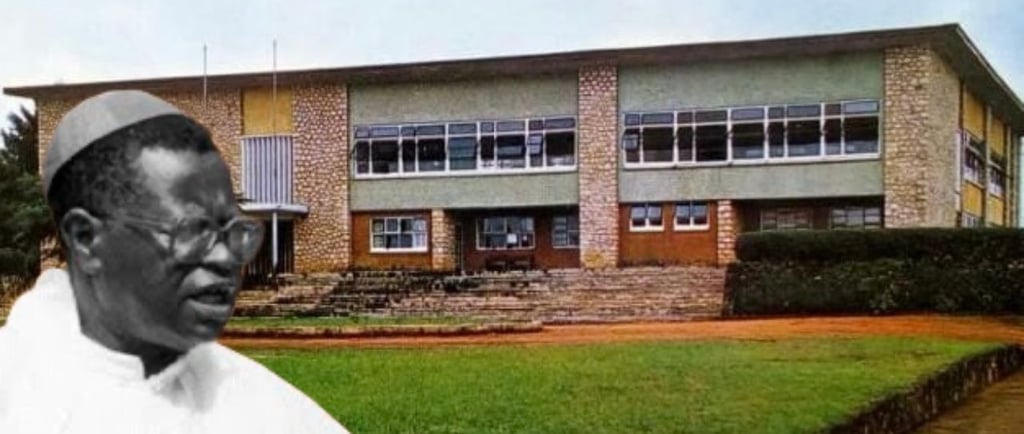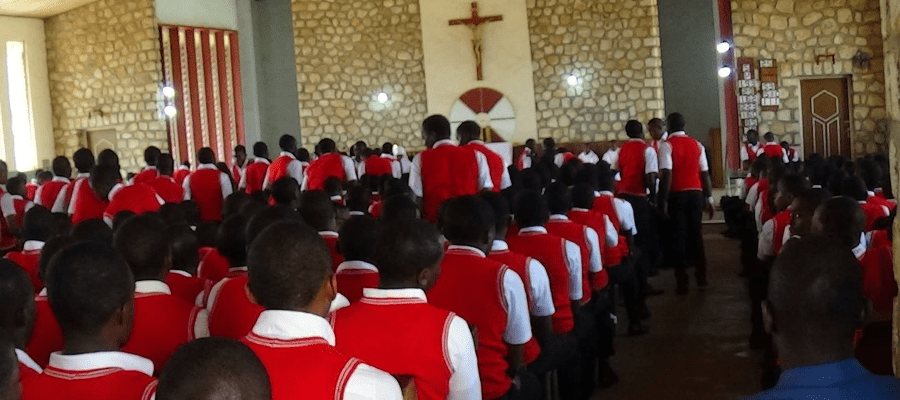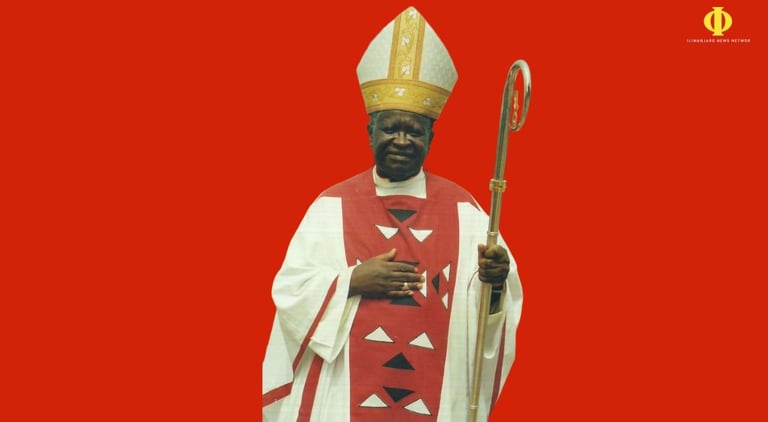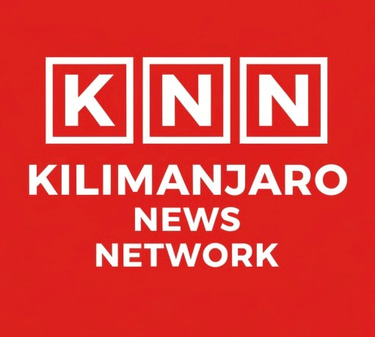Educated to betray: Archbishop Verdzekov’s Uncanny and Prophetic Suspicion of Elite Education in the Cameroon Anglophone Heartland.
Education was supposed to be our weapon, our escape, our redemption. Instead, it has become the knife in our backs. Decades ago, Archbishop Paul Verdzekov stood in the chapel of Sacred Heart College, Bamenda, and thundered a warning that seemed almost heretical: “I am suspicious of education.” Today, his words ring like prophecy fulfilled. From the hallowed halls of Anglophone Cameroon’s elite schools now march not defenders of the people but polished traitors—campaign managers for Paul Biya’s dying regime, educated not to serve, but to sell.
OPINION
Theodore Nkwenti
9/21/20255 min read


In the shadowed pews of the chapel of Sacred Heart College, Mankon, Bamenda, the late Archbishop Paul Verdzekov, who left us in 2010, once thundered a soul-searching homily that still echoes in my mind like a thunderclap in the rainy season: “I am suspicious of education,” he bellowed. Himself an erudite scholar, he was not in any way, shape or form dismissive of learning’s light. Au contraire, this was a blistering slap down of its shadows—of how the gleaming halls of Cameroon’s elite institutions, those vaunted “citadels of learning and excellence,” forge minds sharp as scalpels yet hearts as cold and ruthless as the steel they wield with perfect insouciance.
Archbishop Verdzekov, the shepherd of the Northwest Region’s faithful, painted a grim portrait of their alumni: brilliant graduates who wield their diplomas like shields, hardly defending justice or their underprivileged people, but the very regime that crushes them. They emerge fluent in the languages of power—French bureaucracy, English legalese, the arithmetic of corruption—yet skilled in forgetting the cries of the marginalized from whence they came
"I am suspicious of education”
Fast-forward to this sweltering September, and Archbishop Verdzekov’s ghost must surely weep. A leaked list of campaign managers for Paul Biya’s 2025 presidential bid in the Anglophone regions—the Northwest and Southwest, those bleeding battlegrounds of Cameroon’s seven-year grinding, brutal civil war—reads like a roll call from those same citadels. Saint Joseph’s College Sasse, the cradle of Anglophone intellectualism in Buea; Sacred Heart College in Bamenda, a bastion of discipline amid the hills; Cameroon Protestant College in Bali, where moral rigor meets academic might; Our Lady of Lourdes College in Big Mankon, Bamenda, neatly tucked away in the slopes of station hill, shaping principled leaders; Government Bilingual High School in Yaoundé, the bridge between colonial divides, etc.
These are some of the names that surface, alumni now marshaling votes for an absentee, drooping senile candidate, not seen in public since his cryptic announcement for reelection on X (formerly known as Twitter). Biya, at 92, the world’s oldest head of state, who hasn’t set foot in the crisis zones he helped ignite. A president with outsize political power who has been suckling at the teats of Cameroonian taxpayers like a vampire since his teenage years, who in 43 years as president has turned his country into a Soviet style dystopia, a wasteland and despair.
Yet in the Anglophone regions, where separatist fighters declare “Ambazonia” and villages burn under military sieges, where the decay of Biya’s corrupt presidency is evermore present, his local champions are not grizzled Francophone loyalists from Yaoundé or Sangmelima. No—they are: polished sons and daughters from the coastlines of Victoria to the grassfields of the Northwest, betrayers in borrowed suits who have taken the loyalty oath to the oppressor.
The pain of this disloyalty cuts deeper than any bullet in the heartland of Bamenda or Buea, cruelly echoing Julius Caesar's anguished last cry, “Et tu, Brute?” - a piercing reminder that even the closest of friends can inflict the deepest wounds. These regions, heirs to British Southern Cameroons, have nursed a grievance since unification in 1961: the slow erasure of their common-law traditions, their English tongues drowned in Francophone tides, the systemic drive at assimilation, the gradual plunder and destruction of their corporations and institutions. The 2016 protests—lawyers and teachers demanding cultural survival—sparked the crisis, met not with dialogue but with tanks and ghost towns. Over 6,000 dead, half a million displaced, schools shuttered, and still Biya’s response is a “special status” that mocks autonomy, a national dialogue that silences the diaspora.
Into this inferno step the elite alumni, campaign managers, not guided by morals, conscience or truth but by a power compass and naked greed, promising sweet nothings of stability and Biya’s empty phantasy project, “Emergence 2035” while their people waste away in slow motion. One, a Sacred Heart graduate turned CPDM operative, reportedly boasts of “delivering” Bamenda’s vote; another, from Cameroon Protestant College, funnels funds to militias disguised as development. These two-faced extortionists, leeching off the taxpayers, are the embodiment of Archbishop Verdzekov’s suspicion: educated to lead, but lured to lord it over the lowly.
Why this treachery? The citadels, for all their excellence, are fortresses of illusion. They dangle scholarships and prestige as lifelines, but the strings attach to Yaoundé’s puppet masters. An education from these ‘citadels of excellence’ isn’t just parchment paper—it’s a ticket to the inner circle and the halls of power, provided you pledge fealty to the regime that funds the facade. These slimeballs, hailing from marginalized hamlets where potholed roads meet thatched roofs, trade communal memory and loyalty for coveted positions in Biya’s regime. They parrot Biya’s script—“unity above all”—while their kin dodge ambushes on the road to Kumbo, Mundemba or to Lebialem. It’s a Faustian bargain: personal ascent at the expense of collective crucifixion of the unwashed masses. Archbishop Verdzekov read the tea leaves perfectly: education, unchecked, breeds not patriots but parasites, who dine on foie gras and sip champagne in Yaoundé with breezy indifference while their villages burn to ashes.
This is no mere electoral footnote; it’s a symptom of Cameroon’s rot and decay. Biya’s CPDM, the People’s Democratic Movement in name only, thrives on such compradors and tokenism - a cesspool of self serving Anglophones co-opted to legitimize the illegitimate. As the October 12 vote looms, with opposition firebrands like Maurice Kamto barred and Ambazonian separatists vowing boycotts, these campaign managers will rig the charade. Ballots stuffed in ghost towns, voters intimidated in villages. The international community tut-tuts from afar, but who will call out these educated enablers? The UN? The AU, with its own gerontocrats?
Archbishop Verdzekov, no political savant, had his finger on the pulse of the nation. He diagnosed with arcane and uncanny accuracy the intellectual and cultural zeitgeist of the country, the ugly, soft underbelly of academia, its shameless, incestuous relationship with power and politics, its disdain for the underserved and their cry for help.
Yet, this is no time to despair. Let alumni networks become resistance cells, not rubber stamps. And let Anglophones, in the ballot box or the barricade, reject the backstabbing, duplicitous weasels who campaign for chains and continuous marginalization. For in betraying their people, these phony turncoats don’t just wound the Northwest and Southwest; they desecrate the souls of the underprivileged gasping for breath.
Anglophones deserve leaders forged in the fire of its fields, not the chill of elite indifference and brazen dishonesty.
Suspicion of education? No—suspicion of venal auxiliaries who use it for self interest and self preservation at the expense of their people. So, don’t get paralyzed with fear, disappointment and despair! Instead, organize and strategize, continue to scream from the rooftops, because in every struggle, the people always have the last word. Always. As Chinua Achebe reminds us in Arrow of God, “no one ever won judgment against his clan.u” No one.





